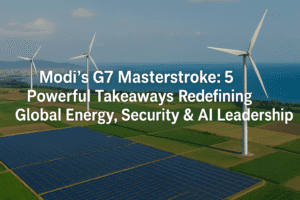Modi’s G7 Masterstroke: 5 Powerful Takeaways Redefining Global Energy, Security & AI Leadership
Prime Minister Modi used the G7 platform to forcefully advocate for a cooperative global approach to critical challenges. He presented India’s “4A” energy framework (Availability, Accessibility, Affordability, Acceptability) as essential for all nations, highlighting India’s achievement of meeting Paris goals early while pushing initiatives like the Solar Alliance to democratize clean energy. Modi unequivocally demanded an end to double standards on terrorism, framing attacks like Pahalgam as assaults on humanity and challenging global complacency.
He amplified the urgent priorities of the Global South, disproportionately harmed by conflict and climate impacts. Crucially, Modi connected the dots between technology, energy, and human welfare, warning of AI’s massive energy footprint and stressing that tech must serve common people, requiring secure mineral supplies and diverse data like India’s. His central message: true sustainability demands placing people and planet at the heart of progress through genuine international cooperation, rejecting isolationism and hypocrisy.

Modi’s G7 Masterstroke: 5 Powerful Takeaways Redefining Global Energy, Security & AI Leadership
Prime Minister Narendra Modi’s address at the G7 Outreach Session wasn’t just another diplomatic speech; it was a sharp articulation of India’s vision for navigating the intertwined crises defining our era – energy insecurity, terrorism, and the disruptive rise of AI. Moving beyond the formal press release, here’s the deeper significance and human stakes behind his key points:
- Energy Security: The “4A” Framework as a Global Imperative
Modi’s emphasis on “Availability, Accessibility, Affordability, and Acceptability” (the 4As) transcends India’s policy. It’s a framework desperately needed globally. His point was stark: even as the world’s fastest-growing major economy, India met its Paris commitments ahead of schedule. This challenges the outdated notion that development must come at the planet’s expense.
- The Real Insight: The “Acceptability” pillar – focusing on clean energy – is non-negotiable. Initiatives like the International Solar Alliance (ISA) and One Sun One World One Grid (OSOWOG) aren’t vanity projects; they are practical blueprints for leveraging geography and technology to share clean energy across borders, vital for nations lacking India’s solar potential. His call to strengthen these is a plea for concrete, collaborative action, not just pledges.
- Amplifying the Global South: Beyond Tokenism
Modi positioned India not just as a participant, but as a critical voice for the “Global South” – nations disproportionately bearing the brunt of global conflicts (like Ukraine’s impact on food and fuel) and climate change impacts they did little to cause.
- The Human Cost: When Modi spoke of the “debilitating impact” on these nations, it translates to real suffering: families priced out of cooking fuel, farmers facing ruined crops due to erratic weather fueled by emissions elsewhere, economies crippled by energy import bills. His insistence that the world must understand these priorities isn’t diplomatic rhetoric; it’s a prerequisite for any stable, just global order. Ignoring them fuels migration crises, instability, and resentment.
- Terrorism: Condemning Hypocrisy and Demanding Consistency
Modi’s words on terrorism were arguably the most forceful. Referencing the Pahalgam attack as an “assault on humanity” framed terrorism as a universal threat, not isolated incidents. His critique cut deep:
- The Uncomfortable Questions: His three piercing questions expose global failings:
- Will action only come when powerful nations are hit? (Highlighting reactive, self-interested policies).
- How can victims and perpetrators be equated? (A direct challenge to equivocation and false moral equivalence).
- Will institutions stay silent? (Questioning the effectiveness of the UN and other bodies).
- The Core Demand: Ending double standards and state sponsorship of terror isn’t just about India’s security; it’s about eroding the very foundations of international law and human security everywhere. Rewarding terror-backers (through aid, trade, or political cover) is a betrayal of all victims.
- AI, Energy, and the Human Imperative
Modi uniquely connected three critical 21st-century domains: Artificial Intelligence, Energy, and Human Welfare.
- The Hidden Cost of Progress: His observation that AI is “energy intensive” is crucial. The massive data centers powering AI have a significant carbon footprint. Promoting AI efficiency without addressing its energy source is unsustainable. His call for “clean and green initiatives” for AI tech is visionary and essential.
- India’s Data Advantage: Highlighting India’s “quality and diverse data” underscores that responsible AI development needs representation beyond Western datasets to avoid bias and serve global needs.
- Human-Centric Tech & Resilient Supply Chains: Modi’s insistence that tech must “bring value to the lives of common people” and the need for secure critical mineral supply chains recognizes that technological advancement is meaningless if it creates new vulnerabilities or leaves billions behind. It’s a call for ethical and resilient innovation.
The Underlying Message: Cooperation Centered on People and Planet
Modi’s address, woven through each theme, was a powerful argument for a new paradigm: Sustainable progress is impossible without cooperation, and genuine cooperation is impossible without prioritizing people (“human-centric”) and the planet. It’s a rejection of zero-sum games and short-termism.
- Why This Matters Now: At a time of fragmented geopolitics, rising protectionism, and escalating climate threats, Modi presented India not just as a rising power, but as a crucial bridge – advocating for the marginalized Global South while demonstrating leadership on global challenges like climate and tech governance. His speech was a reminder that solutions to energy crises, terror, and the AI revolution demand inclusive, principle-based collaboration. The world’s ability to heed this call will define our shared future far more than any summit communique.
You must be logged in to post a comment.